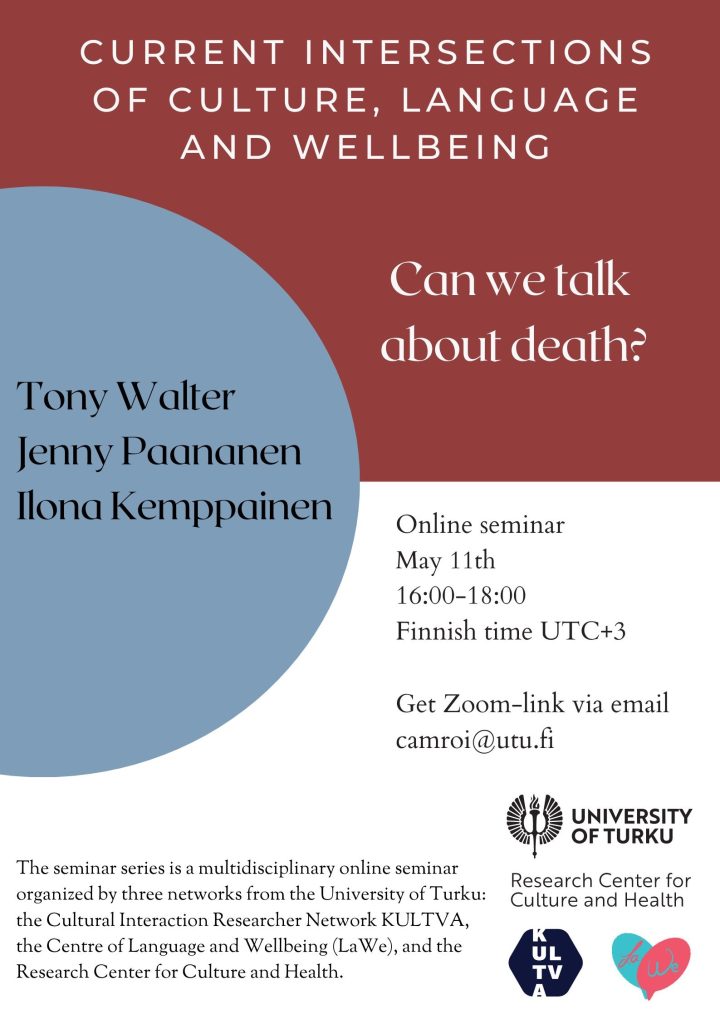Current Intersections of Culture, Language and Wellbeing -etäseminaarisarjan aloitus
LaWe, KULTVA sekä Kulttuurin ja terveyden tutkimusyksikkö aloittavat yhteistyössä uuden, kansainvälisen etäseminaarisarjan Current Intersections of Culture, Language and Wellbeing. Ensimmäisessä seminaarissa pohditaan jännittävää mutta kaikkia koskettavaa aihetta: Kuinka suhtaudumme kuolemaan? Kuinka kuolemasta voidaan puhua? Lämpimästi tervetuloa mukaan!

Seminar series
Current Intersections of Culture, Language and Wellbeing presents: Can we talk about death?
May 11th, 16-18, Zoom
Welcome to the first online seminar of multidisciplinary seminar series Current Intersections of Culture, Language and Wellbeing!
The theme of the first seminar is Can we talk about death? In this seminar we will take a multidisciplinary perspective on death and how it is understood, how it is an inevitable part of our lives and how there are cultural and social rules around death and communication around it.
In this seminar three scholars will explore death in various perspectives: in light of Hartmut Rosa’s theory of alienation and resonance, from the viewpoint of end-of-life discussions with nursing home residents’ family members, and various and sometimes controversial practices around remembering the deceased ones.
The seminar series Current Intersections of Culture, Language and Wellbeing is a multidisciplinary online seminar organized by three networks from the University of Turku, Finland: the Cultural Interaction Researcher Network KULTVA, the Centre of Language and Wellbeing (LaWe), and the Research Center for Culture and Health. The aim of the seminar is to foster international networking and research collaboration between social sciences, humanities, and linguistics, focusing on topics related to health and wellbeing.
Abstracts:
Tony Walter: Resonance at the end of life
The paper suggests that German sociologist Hartmut Rosa’s theory of alienation and resonance offers a comprehensive and novel inter-disciplinary framework for understanding the various ways people live in the face of death, whether personal or collective. The paper explores resonance , i.e. living well, a) when approaching one’s own death, and b) in a world facing climate warming, mass species extinctions, billions of excess human deaths, and the consequent demise of our current civilisation.
Literature: Rosa, H. Resonance: A sociology of our relationship to the world, Cambridge: Polity, 2019
Jenny Paananen: Never say die
Death and dying are considered as dreaded issues that require sensitive handling in interaction. Healthcare practitioners are advised to approach end of life matters cautiously in patients’ or family members’ own terms, to be clear about uncertainty, and to focus on positive aspects. In this conversation analytic paper, I consider authentic care planning meetings between nursing home staff and family members of residents with severe dementia, and illustrate how the unpredictable, progressing nature of the condition challenges the practices used in end of life talk. As the care planning meetings with family members are typically arranged once a year or even more seldom, the staff members need to consider preparing the family members for the resident’s death ahead of time. This paper explores the tension between realism and sensitivity, and reflects the concepts of good life and good death.
Literature: Ekberg, H.; Parry, R.; Land, V.; Ekberg, K.; Pino, M.; Antaki, C.; Jenkins, L. & Whittaker, B.: Communicating with patients and families about illness progression and end of life: a review of studies using direct observation of clinical practice. BMC Palliative Care 20, 186, 2021.
Ilona Kemppainen: Who are we in death?
We are dead longer than we are living, and the community consists also of its deceased members. It is not inconsequential how we remember them, and how we celebrate their memory. Remembering, by the dying person but also by the family and community, is essential for the survival of individual people and societies after death. Acknowledging who the deceased person was is sometimes also controversial. How do we want to be remembered? How do others remember us? Does the society limit how we commemorate our loved ones? Funerals are a focal point in this process, but commemoration can and should begin even when the person is still living – they should have a voice in their afterimage. A funeral will is a simple way of doing this; memorial books and oral histories are something to be passed on to future generations.
Literature: Ruin, H. Being with the Dead. Burial, Ancestral Politics and the Roots of Historical Consciousness. Stanford University Press 2019.
